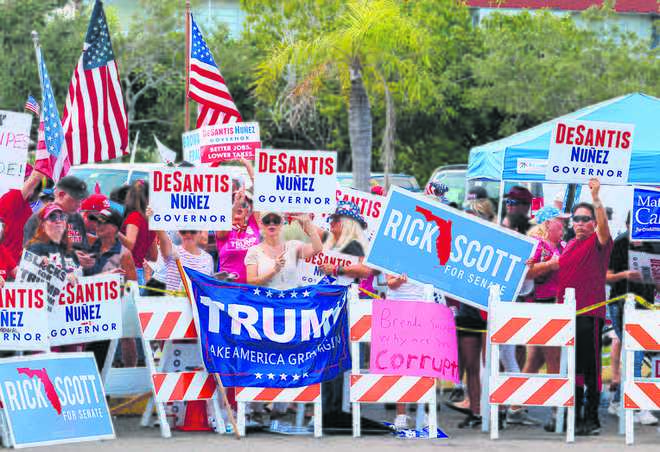
RIGHT PATH: If India plays its cards right, a Democratic majority may help move the Trump administration away from its obsession with trade as the focus of its ties.
KP Nayar
Foreign affairs writer
AN increase in the Republican majority in the US Senate in the November 6 mid-term elections is good news for India. Democrats capturing the House of Representatives from Republicans is also good news for India.
The Senate results hold out the tantalising possibility that America’s India policy, which has been adrift for two years, could, at last, get a sense of direction. A Democratic majority in the House of Representatives will — if India plays its cards right — act as a catalyst in moving the Trump administration away from its obsession with trade as the primary focus of ties with India.
Democrats and Republicans are equally enthusiastic about India. Here is an instance of why India has no reason to worry about the outcome of the mid-term polls. Five years ago, the two rival political parties were in a standoff on Capitol Hill. The Senate was not clearing any appointments made by President Obama. Yet, Chandigarh-born Sri Srinivasan was confirmed by the Senate as a judge in the US Court of Appeals, the second most powerful court in the country. That too, by a unanimous vote of 97 to 0. Srinivasan became the first Indian-American to be made a Circuit Court judge. Only because he was of Indian origin, there was goodwill and no one on Capitol Hill said anything against him, even as the country was otherwise split down the middle.
With Republicans increasing their razor-thin lead in the outgoing Senate to a working majority on November 6 — although still short of the filibuster-proof 60 Senators in a chamber of 100 — it is likely that several appointments critical to the Trump administration’s India policy may be cleared by the new Senate.
The last Assistant Secretary of State for South and Central Asia, of which India is the main component, resigned in January 2017. Trump, new to the White House, could not find a replacement for Nisha Desai Biswal, whose credentials in India-related diplomacy and development initiatives are outstanding. This important position of point person for India, which requires confirmation by the US Senate, remains unfilled to this day.
Richard Verma also quit as US ambassador to India on the day Trump was sworn in as President. Because Trump could not decide who should succeed Verma, there was a diplomatically unusual spectacle of Modi visiting Washington in June for the PM’s first meeting with Trump without a US ambassador in place in New Delhi.
Prodded by Senator Mark Warner, Co-Chair of the influential Senate India Caucus, Trump nominated Kenneth Juster as ambassador to India, nine months after he assumed office. Because of Juster’s foundational role nearly two decades ago in transforming India-US high technology cooperation, the Senate quickly confirmed him. Had it not been for intervention by the Senate India Caucus, Roosevelt House, the residence of the US envoy in Chanakyapuri, may have been unoccupied even today.
What is true of the Assistant Secretary of State for India — and South Asia — is true of other departments in the Trump administration. In several executive branches that are critical to India policy, it is the same story with Trump. Washington has witnessed a blame game between the legislative and executive branches about who is responsible for the huge number of unfilled posts in the administration.
Just before the mid-term polls, Secretary of State Michael Pompeo said in a statement: ‘There are more than 60 State Department nominees awaiting confirmation in the US Senate. That is more than a quarter of all the senior-level positions at the department.’ Senator Bob Menendez, the senior-most Democrat on the committee that clears presidential appointments, had a different view. ‘This administration’s continued inability to adequately or appropriately fill key national security positions puts our nation at risk.’ Pompeo retorted that the ‘risk to the nation lay at the feet of Senator Menendez. We need our team on the field to conduct America’s foreign policy, and today I call on the Senator and his colleagues to stop this delay and obstruction now.’
Because the State Department’s South and Central Asia bureau has been headless under Trump, Deputy Assistant Secretaries, next in the chain of command, have been playing musical chairs. There are five such posts, all of which are now staffed by ‘acting’ officers. Since Trump became President, there have been two acting Deputy Assistant Secretaries dealing with India. In addition, four posts of ambassador in this bureau’s jurisdiction, including Pakistan, are vacant.
Such drift robs the administration of a vision and creative inputs into inter-agency dialogues, where US policies are crafted. This has had a cascading impact on all of official Washington. At the time of writing, in the Office of India Affairs in Foggy Bottom, the State Department headquarters, the post of Deputy Director is vacant. Three positions of India desk officers are vacant. So are jobs of political unit chief, two economic officers, a political officer and a foreign affairs officer. This listing of gross neglect by the administration in ensuring institutional continuity for prioritising India that was a hallmark of all previous administrations going back to Clinton in 1992 is by no means exhaustive.
Had there been an Assistant Secretary, who had direct, personal access to the President, like Robin Raphel who was Clinton’s contemporary in his college days in England, Trump could have been persuaded to accept India’s invitation to be chief guest at the Republic Day next year. With a capricious and fickle occupant in the White House, the twin chambers of the US Congress are India’s best bet. The mid-term election results have done nothing to diminish this great asset to India-US relations.



























